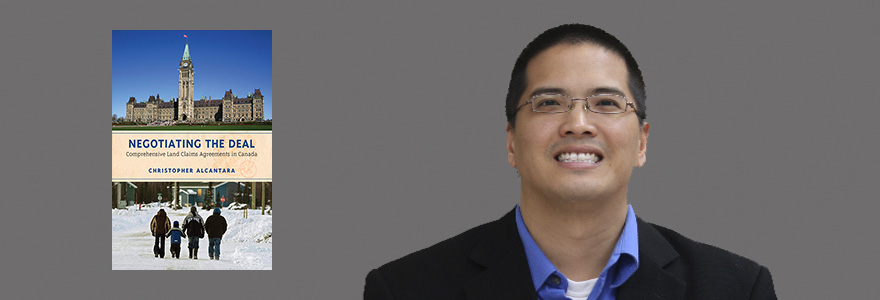News and Updates
Contact
Faculty of Social Science
Social Science Centre
Room 9438
Western University
T. 519-661-2053
F. 519-661-3868
E. social-science@uwo.ca
Alcantara wins American Political Science Association book award
June 15, 2017
Negotiating the Deal by Christopher Alcantara, Associate Professor in the Department of Political Science, has been awarded the American Political Science Association's S.M. Lipset Best Book Award for 2017.
The “Seymour Martin Lipset Best Book Award” is given to honor a significant contemporary contribution to the scholarship on Canadian politics, or Canada in a comparative perspective, or a comparative analysis of Canada with other countries, particularly the United States.
“It's an amazing honour. APSA is the largest political science association in the world and the previous winners of this award are some of best political scientists in the discipline,” said Alcantara. “ To have won an APSA award, first of all, and then to win a prize that has been won by the likes of Janet Ajzenstat, Andre Blais, Ken Carty, Royce Koop, Stuart Soroka, and Mildred Schwartz among others, is truly amazing and humbling.”
Negotiating the Deal: Comprehensive Land Claims Agreements in Canada, published in 2013, is the first systematic and comprehensive analysis of the factors that explain both completed and incomplete treaty negotiations between Aboriginal groups and the federal, provincial, and territorial governments of Canada.
Based on the experiences of four Aboriginal groups, Alcantara argues that scholars and policymakers need to pay greater attention to the institutional framework governing treaty negotiations and, most importantly, to the active role that Aboriginal groups play in these processes.
Since publication, the book has been cited and used by economists, political scientists, geographers, Indigenous Studies scholars, anthropologists, and legal scholars.
Speaking to Northern Public Affairs Magazine in 2012, Alcantara reflected on the impact of his research:
“I remember several years ago sharing some of my initial findings with several senior government officials. One of them remarked that he thought the findings would be useful for reforming the treaty process. I never thought anything would come of it but the announcement in the fall (of 2012) reminded me how our research can sometimes have a significant effect on public policy (assuming my work actually did have any influence!).”
The book has also received the Best Book in Canadian Studies awarded by Canadian Studies Network in 2014.

